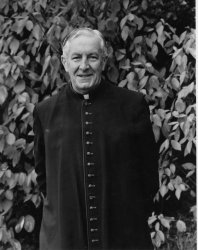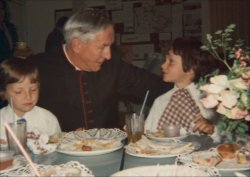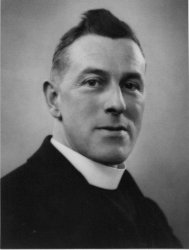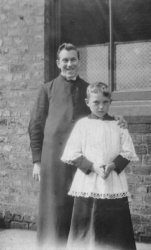
History
History
Rev Cormac McGonagle (by Bishop John Brewer)
I Got to know Canon McGonagle the day after I arrived at Sacred Heart, Moreton which was my first appointment in the Diocese. It was 1959. He rang me up and said that I should need a friend, and, as I would be coming up to the F.C.J. convent at Upton for Mass, I would be welcome to cross the road to see him. I did so. And he then and there told me how to go about being a priest in the parish, how much support priests needed in their lives - from lay folk, and especially from brother priests. In those days, Collaborative Ministry and the solidarity of the Presbyterate were unknown terms, but the reality of his fatherly friendship and pride in his parish were for me very inspiring. He had a real love for his people.

Five years later, they sent me off to Rome, but I tried to see him whenever I came home on leave. And when I became Auxiliary Bishop of the Diocese, he could not have been kinder to me. He sometimes introduced me to people by saying: ‘I taught him all he ever knew’. He was not a million miles from the truth.
He and I both left the Diocese about the same time, but we still kept in touch, at least at Christmas time. His character and his commonsense approach to priesthood were, and are, still very precious to me.
Cormac McGonagle was born at Bankhead, Carndonagh, in County Donegal on 20th August 1909. He studied in Carndonagh, Derry, Maynooth and, finally, at Oscott College. He was ordained for the Diocese on 7th June 1936 by Bishop WilliamMcNeely in the Cathedral at Letterkenny.
He served as an Assistant Priest in St Werburgh’s, Birkenhead, St Hilda’s, Northenden, and St Vincent’s, Altrincham. They still remember him there.
From 1950 to 1957, he was parish priest of Ellesmere, before going to St Joseph’s, Upton, for 26 years. I was amazed that he only spent seven years in Ellesmere, for he left a great part of his heart in Ellesmere. He would talk about the farmers and how he would go to market with them and vet the cattle before they put their money down for Cormac McGonagle was a man of the land. And the land, his own soil, drew him back to his native Donegal for the last thirteen years of his life. In Culdaff he would ‘wander about and enjoy the company of Fr Barney Duffy and the good people of the parish’. These happy days in his beloved Inisshowen were enriched by his nearness to his family and the devoted care of his housekeeper Brighid.
He died peacefully in the parochial house at Culdaff on 2nd September 1996.
The readings chosen for the Memorial Mass are very appropriate. They resonate with me; phrases jump out when I think of Cormac. ‘I made him a witness to the peoples’; ‘Happy are those who die in the Lord ... since their good deeds go with them’; ‘Whoever comes to me, I shall not turn him away’.
I think those words of St John sum up the relationship we priests should all have with our people. To have time for all who cross our path - who can interrupt what we are doing without resentment There is something inherently disorganised about a priest’s life - it has to be if we are to be what our people want us to be - simply available. The Lord had no diary of appointments! To be available to all, no matter what the reason (or lack of it) is so Christ-like.

These words of St John are part of his Discourse on the Eucharist It reminds me that I am called to be the Bread of Life to my people. I am called to ensure that no-one goes away hungry. All of us are invited to do, not our own will, but the will of Him who sent us, and to lose no-one God has given to us to shepherd in our parishes. All of us are called to raise people up, not diminish them.
It is these thoughts which I feel are the best thank you to God I can see in Cormac McGonagle, both here in the diocese and in County Donegal. He took these words to heart and made them his own. It is these things which he bequeaths to me.
I think of his love for young people and his work for the schools. I think of his pounding round the parish in Lent on the mighty onslaught of knocking on doors.
He was determined not to lose a single one that God had given him to lead and to shepherd.
We owe so much to our Irish priests. They have been a wonderful gift to the Church in this country. and he was one of the best. May his great soul rest in peace.
Rev Maurice Stone
In 1967 a group of silver jubilarians were discussing the meal which was to follow a special Mass to be celebrated at St. John the Baptist, Timperley. They realised that a golden jubilarian was also to be present, but for some reason presumed that he would not want to make a speech.

Their surmise was wrong and the jubilarian in question, Father Stone, was only too eager to speak. He probably surprised many of the priests who were present at his oratory. He delighted them with a story of a new puppy which had kept him awake and as a result he overslept. As he was the chaplain to the Sisters of the Poor in Birkenhead he tried to explain to the Superior what had happened. He gave his explanation and for about a week she refused to speak to him. On enquiring the cause he learnt that she thought he had said that he had overslept because he had been to the pub, mistaking this word for pup.
In the same speech he told us that he had been a Franciscan and among his duties had been one of going round the country making appeals for the Catholic Truth Society. When he came to the conclusion that he was more suited to the life of the pastoral clergy he applied to be incardinated in the Shrewsbury Diocese because it was the one that had exercised the greatest attraction for him.
He was born in Stockport on 16th July 1894. He was educated at St. Bernardine s College. Buckingham. He joined the Order of Friars Minor and was ordained on 29th June1917. He left the Order in 1930 when he became incardinated into the diocese.
After a number of years he became parish priest of St. Joseph's, Upton, where parishioners were still using the Convent Chapel. He realised that the time had come to build a parish church and was delighted when the Bishop allowed him to approach Adrian Gilbert Scott to be the architect. At the opening the latter admitted that the new church was the smallest he had ever built and likened it to a village maiden.

While at Upton Father Stone frequently received visits from a former mayor of Birkenhead who had time on his hands. He was beginning to find the visits a bit of a trial so he resorted to a strategem. On the next visit he explained that he had to see a parishioner and his visitor was quite welcome to accompany him. He took care to take him to the furthest part of the parish and was troubled no more.
He moved from Upton to Dukinfield but eventually asked the Bishop for an easier post and so he came to the Little Sisters as their chaplain. He continued to live in the house near the convent when he retired and then when the decision to close the Birkenhead foundation was made went with the Sisters to their convent in Liverpool.
They nursed him with great devotion in his last illness. He had grown so old that he felt the loss of contemporaries. He was an exemplary priest, noted for his punctuality, attention to duty, a spruce appearance and impeccable manners.
Rev John Porter
Father John Porter was born at Dukinfield and after following his course of studies at Ushaw and the English College. Rome, was ordained In 1909. His curacies were served at SS. Peter & Paul's, New Brighton, St Werburgh's, Birkenhead and St. Werburgh's. Chester.
On his appointment as parish priest, in 1925, Pr. Porter took charge of St. Mary's, Shifnal for four years. and then moved to Upton. In 1931, he became parish priest at Our Lady's, Latchford, and three years later, at St Werburgh's. Birkenhead. he had already done a period of service as Diocesan Inspector of Schools.
In 1936 Indifferent health brought a change from Birkenhead to one of the most beautiful parts of Shropshire, and at Church Stretton, Fr. Porter passed the remaining 21 years of his life, he died suddenly on August 22nd. aged 77. By his death, the small Catholic community there lost a wise counsellor and friend.
His Lordship the Bishop offered the Requiem Mass at Church Stretton, assisted by Fr John Porter of St. Mary's, Billington nr. Blackburn, and Fr. J. O'Donnell of Our Lady's, Stockport, nephews of the deceased priest. The interment took place in the family grave at Dukinfield.
Simple and retiring in character, nevertheless Fr. Porter was well known and respected by many people. He was never happier than when in the company of his fellow clergy.
Rev William Corcoran
Father "Willie", as he was affectionately known to his fellow priests, was born on January 27th, 1879. He received his early education from the Jesuits at the Preston Catholic College. The family moved from Preston to Birkenhead via Manchester and so it was as a Shrewsbury Church Student that he went to Cotton College and then to Ushaw. At both colleges he was remembered chiefly as a sportsman. He was captain of games at Cotton and at Ushaw he played for "The House" at football and cricket. One innings at Ushaw remained a record for several generations. At the end of his two years of philosophy, however, he had decided that his vocation was more towards the contemplative life and he was accepted as a postulant with the Trappists at Mount Melleray In Ireland, in 1903.
After finishing his novitiate and studies he was ordained in 1910 and became Fr. Cuthbert, O.C.R. He was happy in his monastic life and particularly enjoyed teaching English in the school there. In 1918, however, the "Great 'Flu" epidemic hit the monastery. Only three monks stayed on their feet including Fr. Cuthbert. After nine days and nights without any rest he collapsed from complete physical exhaustion. With his health badly impaired he was sent to Mount St. Bernard's in Leicester. In spite of the change he could not regain sufficient energy for the rIgorous discipline of the Trappists. He was advised to seek a dispensation from his monastic vows and to offer his services as a secular priest for the few years of life that were supposed to remain for him. After a period of convalescence and some supply work in Westminster he came back to his own diocese and served it faithfully for 45 years.
Because Fr. Corcoran was older and possibly more mature than the average curate the Bishop chose to send him to a succession of parishes to help some of the legendary giants of the diocese in their declining years. He was assistant priest to Canon Welch at Altrincham, Canon Mottram at Seacombe, Fr. Cregan at Northwich and Canon Hennelly at St. Werburgh's, Birkenhead. His first parish was at St. Joseph's, Upton, where, for 15 years, he combined the duties of Parish Priest and Chaplain to the Convent. He also opened the Chapel of Ease at Greasby prior to its becoming a separate parish. From Upton he went to Knutsford until 1947 when, after a short time as chaplain to the Poor Ciares at Tattenhail, he moved to Acton Burnell where he remained until his retirement. He was particularly blessed in his retirement at Lichfield by the tender care and devotion of Mr. and Mrs. Emery and their children with whom he lived as one of the family.
Fr. Corcoran always retained his preference for the quiet and the contemplative life, but as a Diocesan Priest he was a model of devotion and care for his people. He had a deep understanding of human beings and human problems and a precious gift of real sympathy. His advice and guidance were sought by priests and religious even after his retirement. He knew from his own experience the problems of community life and the priestly life. As a monk he had steeped himself In the writings of the great masters of the spiritual life and as a teacher he had aquired an extensive knowledge of his English classics. He could quote from both at length and it was often by using an apt quotation that he would solve a problem. In his humility he gave the credit to the author and it was quite often a recent author since he continued to keep up to date with his reading. His deep sincerity enabled him to speak about pious things, about God and the Blessed Mother, without ever giving the impression of being sanctimonious. Such a word would be anathema to one whose mischievous sense of humour was only kept in check by his universal charity.
While he was at Mount Melleray, Fr. Corcoran was often called upon to entertain that great Irish litterateur and author Canon Sheehan. He was well acquainted with all the Canon's books and one of his fondest quotations was from "Luke Delmege" where the dying priest says that he wishes to be buried near the statue of our Blessed Lady and within sound of the Mass. "There I spent my happiest hours on earth. I shall not rest anywhere but where I can hear the Mass-bell. I have decided to remain where the Divine Mother will look down with her pitying eyes . . . and where the syllables of the mighty Mass will hover and echo when the church is silent betimes. And no foolish epitaph. 'Here lieth' and 'Pray for his soul.' That's all."
Father Corcoran died in retirement at Lichfield on Christmas Eve 1967. He was only a month short of 89 but he had said his morning Mass as usual and found time during the day to write two letters in his distinctive and firm script and without the aid of spectacles. Although he had been retired from parish life for some three years he still rejoiced In being able to continue the work and office of a priest in the offering of his Daily Mass. He kept himself busy also with a quite extensive correspondence. He died quietly and peacefully as he had lived.
He is buried now within earshot of the chapel at Acton Burnell within sound of the Mass and within sound of the nightly "Salve Regina" which both meant so much to him. His Requiem was concelebrated by His Lordship the Bishop and his four priest nephews with Fr. Abbott the present Parish Priest. There was a note of triumph rather than of sadness as his remains were carried through the convent grounds accompanied by so many of his fellow priests, It is with greatest confidence that we pray, "Grant him eternal rest."
Rev Edmund O'Connor (by Mrs J Allen)
On April 1st 1929 the then Parish Priest of St. Joseph's died. Father Edmund O'Connor, who had. not long since celebrated his Golden Jubilee as a Priest, was buried in the village cemetery in Salacre Lane and his long funeral procession passed through a silent mourning village of closed shops and drawn blinds. The Rev. Canon Bellamy, then Vicar of St. Mary's, stood outside his church and failed to hide his tears as the cortege of his old friend passed by, and the children of St. Joseph's, at the end of the long procession of priests and mourners, carried spring flowers to the cemetery.
As one of those children, the memory of Father O'Connor has lingered over the years. My recollection is of a round, smiling man, with a booming voice which called "Hello" at the Convent gates and could be heard all the way to those of St. Mary's at the other end of the village. He knew every villager personally, both Catholic and non-Catholic, called all by their Christian names and was welcome in every home. Always at his heels was his Scots terrier dog, Prince, who used to wait in the vestry during the Mass, and when Father O'Conner reached the closing prayer "And do Thou, PRINCE of the Heavenly Host", to the delight of the children who in those days sat in the two front benches under the watchful eye of either Mother Ethelburga (Head Mistress of St. Joseph's) or Mother Sophia (Infants Teacher) the dog would howl and scratch at the door until the Mass ended and his Master joined him. He took snuff from a worn silver box which he kept in his pocket - a puzzling habit which fascinated the children.
It was said that he never owned an overcoat - he gave them away to any passing tramp who called at the Presbytery, until in his latter years his housekeeper tried, not always successfully, to hide them away.
He had a remarkable understanding of children and loved to be with them, and as soon as he appeared in the village they surrounded him. In those days the children of St. Joseph's School were privileged to enjoy an annual sports day in a field in the Convent grounds, and there used to be a huge barrel of sweets which each child was invited to dip into and take out a handful. Somehow Father O'Connor was always nearby to "dip" for the little ones with the tinier hands! Another day of great excitement was the annual children's outing to Barnston Dale. I remember the donkey rides and the organised games and races, and again Father O'Connor was in the vicinity of the sweet barrel to ensure that the smaller children got their fair share of the contents.
First Holy Communion Day was preceded by special instruction sessions which took place in Father O'Connor's study at the presbytery. Somehow, whilst managing to stress the importance of the occasion and its solemnity, he made First Holy Communion Day a joyous occasion always to be remembered. Each little girl was given a large medal inscribed "Commemoration of First Holy Communion" on a broad white ribbon to wear round her neck (something like today's "Jim'll fix it" badges!) and the boys' medals were attached to a ribbon bow which they pinned on their white shirts. Each child also received a Certificate of First Holy Communion. Mass was followed by a celebration breakfast of a boiled egg and strawberry-jammed toast, also at the presbytery.
He visited sick Uptonians in hospital, especially the children, and I have a special memory of ouch an occasion when he came to see me at the Children's Hospital in Liverpool, bearing a beautiful doll which be had 'begged' for me. we had a serious discussion on what was to be its name, and I remember I wanted to call it Rose, but he pointed out that there was no more beautiful name than Mary and I was torn with the desire to please him and yet have my own choice. He always he had the perfect solution and when I left hospital some months later I brought Rosemary home with me.
The journey to Liverpool in those days was difficult and tiring. A small single decker bus ran infrequently from Salacre Lane, which was the terminus, into Claughton Village. On arrival there Father O'Connor would take a tram to Woodside, sail on the ferry to the Pier Head and then take another tram ride or walk to the hospital he happened to be visiting. This tiresome journey was taken time and again by an ageing priest when visiting sick villagers or their children.
His Golden Jubilee was a time of great rejoicing and amid much secrecy a surprise celebration concert was organised and held in the school when fifty golden sovereigns, collected by the schoolchildren, were presented to him in a gold mesh bag. At the end of the concert he made a special request that we should sing his favourite hymn "Hail Queen of Heaven" and he stood by the piano, using the blackboard pointer as a baton, urging us to sing loud enough to be heard in Saughall Massie!
Father O'Connor, who was in fact a Londoner by birth, was by his own wish buried in Upton amongst the villagers he loved and served so well, and I still recall the sorrow of the day he died - my mother's tears and the mixed feelings of sadness and pleasure when Prince was brought to live with us. Although our little house was but a stone's throw of the Presbytery, Prince never tried to return there after his Master's death, and he was a treasured member of our household for the remainder of his years.
No history of long-ago St. Joseph's could be complete without mention of that wonderful 'Pied Piper', that kindly generous Priest who understood his children so well, a devoted Pastor whose example of true Christianity shines on down through the years, and whose memory is still held dear by those fortunate enough to have lived in his time.
 Pennies Make Pounds - Penny jar at the back of church
Pennies Make Pounds - Penny jar at the back of church
